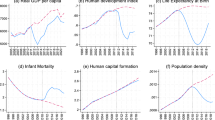Abstract.
There has been considerable opposition to the 2002 Winter Olympics, to be held in the Salt Lake City metro area. This opposition stems primarily from fears of increased population growth due to the international attention. Proponents maintain that the Games will enhance the quality and quantity of jobs in the local economy, mitigating any undesirable impacts. This paper analyzes the experiences of past North American Olympic host regions, rather than the single case of Salt Lake City, to determine whether concerns are substantiated. Findings show that most population growth effects relate to the announcement of the Olympics rather than the actual hosting of the event. While the Olympics are likely to attract jobs to the host region, the nature of this employment growth and its effect on per-capita income are questionable.
Similar content being viewed by others
Author information
Authors and Affiliations
Additional information
Received: October 1997 / Accepted: August 1999
Rights and permissions
About this article
Cite this article
Lybbert, T., Thilmany, D. Migration effects of Olympic siting: A pooled time series cross-sectional analysis of host regions. Ann Reg Sci 34, 405–420 (2000). https://doi.org/10.1007/s001689900017
Issue Date:
DOI: https://doi.org/10.1007/s001689900017




